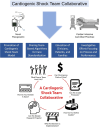Need for a Cardiogenic Shock Team Collaborative-Promoting a Team-Based Model of Care to Improve Outcomes and Identify Best Practices
- PMID: 38456417
- PMCID: PMC11009990
- DOI: 10.1161/JAHA.123.031979
Need for a Cardiogenic Shock Team Collaborative-Promoting a Team-Based Model of Care to Improve Outcomes and Identify Best Practices
Abstract
Cardiogenic shock continues to carry a high mortality rate despite contemporary care, with no breakthrough therapies shown to improve survival over the past few decades. It is a time-sensitive condition that commonly results in cardiovascular complications and multisystem organ failure, necessitating multidisciplinary expertise. Managing patients with cardiogenic shock remains challenging even in well-resourced settings, and an important subgroup of patients may require cardiac replacement therapy. As a result, the idea of leveraging the collective cognitive and procedural proficiencies of multiple providers in a collaborative, team-based approach to care (the "shock team") has been advocated by professional societies and implemented at select high-volume clinical centers. A slowly maturing evidence base has suggested that cardiogenic shock teams may improve patient outcomes. Although several registries exist that are beginning to inform care, particularly around therapeutic strategies of pharmacologic and mechanical circulatory support, none of these are currently focused on the shock team approach, multispecialty partnership, education, or process improvement. We propose the creation of a Cardiogenic Shock Team Collaborative-akin to the successful Pulmonary Embolism Response Team Consortium-with a goal to promote sharing of care protocols, education of stakeholders, and discovery of how process and performance may influence patient outcomes, quality, resource consumption, and costs of care.
Keywords: cardiogenic shock; education; multidisciplinary teams; process improvement.
Figures




Similar articles
-
Cardiogenic Shock Teams: Past, Present, and Future Directions.Circ Heart Fail. 2025 May;18(5):e011630. doi: 10.1161/CIRCHEARTFAILURE.124.011630. Epub 2025 Mar 28. Circ Heart Fail. 2025. PMID: 40151941 Review.
-
Management and Outcomes of Cardiogenic Shock in Cardiac ICUs With Versus Without Shock Teams.J Am Coll Cardiol. 2021 Sep 28;78(13):1309-1317. doi: 10.1016/j.jacc.2021.07.044. J Am Coll Cardiol. 2021. PMID: 34556316
-
Time for a rethink in cardiogenic shock: the shock to survival framework document.Br J Hosp Med (Lond). 2023 Jul 2;84(7):1-8. doi: 10.12968/hmed.2023.0139. Epub 2023 Jul 18. Br J Hosp Med (Lond). 2023. PMID: 37490447 Review.
-
Mechanical Circulatory Support in Cardiogenic Shock: Shock Team or Bust?Can J Cardiol. 2020 Feb;36(2):197-204. doi: 10.1016/j.cjca.2019.11.001. Epub 2019 Nov 9. Can J Cardiol. 2020. PMID: 32036864 Review.
-
Cardiogenic shock teams and centres: a contemporary review of multidisciplinary care for cardiogenic shock.ESC Heart Fail. 2021 Apr;8(2):988-998. doi: 10.1002/ehf2.13180. Epub 2021 Jan 16. ESC Heart Fail. 2021. PMID: 33452763 Free PMC article. Review.
Cited by
-
Future Training Pathways in Percutaneous Coronary Interventions: Interventional Critical Care, Complex Coronary Interventions, and Interventional Heart Failure.JACC Adv. 2024 Oct 14;3(11):101338. doi: 10.1016/j.jacadv.2024.101338. eCollection 2024 Nov. JACC Adv. 2024. PMID: 39741647 Free PMC article. Review.
-
ANMCO position paper: functional reorganization of Intensive Cardiac Care Units (ICCUs) in Italy: Evolution of ICCUs: Growing Needs and the Necessity of a Network With Varying Levels of Care Complexity.Eur Heart J Suppl. 2025 May 15;27(Suppl 5):v205-v215. doi: 10.1093/eurheartjsupp/suaf075. eCollection 2025 May. Eur Heart J Suppl. 2025. PMID: 40385468 Free PMC article.
-
The Price We Pay for Progression in Shock Care: Economic Burden, Accessibility, and Adoption of Shock-Teams and Mechanical Circulatory Support Devices.Curr Cardiol Rep. 2024 Oct;26(10):1123-1134. doi: 10.1007/s11886-024-02108-4. Epub 2024 Sep 26. Curr Cardiol Rep. 2024. PMID: 39325244 Review.
-
Blueprint for Building and Sustaining a Cardiogenic Shock Program: Qualitative Survey of 12 US Programs.J Soc Cardiovasc Angiogr Interv. 2024 Oct 17;3(11):102288. doi: 10.1016/j.jscai.2024.102288. eCollection 2024 Nov. J Soc Cardiovasc Angiogr Interv. 2024. PMID: 39649821 Free PMC article.
-
Second Year In Review, Third Year In Preview, and the 2024 JAHA Top 10.J Am Heart Assoc. 2025 Jan 7;14(1):e040732. doi: 10.1161/JAHA.124.040732. Epub 2025 Jan 7. J Am Heart Assoc. 2025. PMID: 39772643 Free PMC article. No abstract available.
References
-
- Ghajar A, Ordonez CP, Philips B, Pinzon PQ, Fleming LM, Motiwala SR, Sriwattanakomen R, Ho JE, Grandin EW, Sabe M, et al. Cardiogenic shock related cardiovascular mortality trends in US population: heart failure vs acute myocardial infarction as contributing causes. Int J Cardiol. 2022;367:45–48. doi: 10.1016/j.ijcard.2022.08.043 - DOI - PubMed
-
- van Diepen S, Katz JN, Albert NM, Henry TD, Jacobs AK, Kapur NK, Kilic A, Menon V, Ohman EM, Sweitzer NK, et al. Contemporary management of cardiogenic shock: a scientific statement from the American Heart Association. Circulation. 2017;136:e232–e268. doi: 10.1161/CIR.0000000000000525 - DOI - PubMed
Publication types
MeSH terms
LinkOut - more resources
Full Text Sources
Research Materials
Miscellaneous

